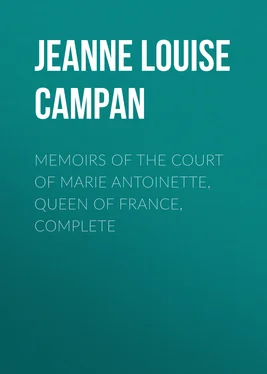Jeanne Louise Henriette Campan - Memoirs of the Court of Marie Antoinette, Queen of France, Complete
Здесь есть возможность читать онлайн «Jeanne Louise Henriette Campan - Memoirs of the Court of Marie Antoinette, Queen of France, Complete» — ознакомительный отрывок электронной книги совершенно бесплатно, а после прочтения отрывка купить полную версию. В некоторых случаях можно слушать аудио, скачать через торрент в формате fb2 и присутствует краткое содержание. Жанр: Биографии и Мемуары, История, foreign_edu, foreign_antique, foreign_prose, на английском языке. Описание произведения, (предисловие) а так же отзывы посетителей доступны на портале библиотеки ЛибКат.
- Название:Memoirs of the Court of Marie Antoinette, Queen of France, Complete
- Автор:
- Жанр:
- Год:неизвестен
- ISBN:нет данных
- Рейтинг книги:5 / 5. Голосов: 1
-
Избранное:Добавить в избранное
- Отзывы:
-
Ваша оценка:
- 100
- 1
- 2
- 3
- 4
- 5
Memoirs of the Court of Marie Antoinette, Queen of France, Complete: краткое содержание, описание и аннотация
Предлагаем к чтению аннотацию, описание, краткое содержание или предисловие (зависит от того, что написал сам автор книги «Memoirs of the Court of Marie Antoinette, Queen of France, Complete»). Если вы не нашли необходимую информацию о книге — напишите в комментариях, мы постараемся отыскать её.
Memoirs of the Court of Marie Antoinette, Queen of France, Complete — читать онлайн ознакомительный отрывок
Ниже представлен текст книги, разбитый по страницам. Система сохранения места последней прочитанной страницы, позволяет с удобством читать онлайн бесплатно книгу «Memoirs of the Court of Marie Antoinette, Queen of France, Complete», без необходимости каждый раз заново искать на чём Вы остановились. Поставьте закладку, и сможете в любой момент перейти на страницу, на которой закончили чтение.
Интервал:
Закладка:
“The Dauphin was little known, and his character has been much mistaken. He himself, as he confessed to his intimate friends, sought to disguise it. He one day asked one of his most familiar servants, ‘What do they say in Paris of that great fool of a Dauphin?’ The person interrogated seeming confused, the Dauphin urged him to express himself sincerely, saying, ‘Speak freely; that is positively the idea which I wish people to form of me.’
“As he died of a disease which allows the last moment to be anticipated long beforehand, he wrote much, and transmitted his affections and his prejudices to his son by secret notes.
“Madame de Pompadour’s brother received Letters of Nobility from his Majesty, and was appointed superintendent of the buildings and gardens. He often presented to her Majesty, through the medium of his sister, the rarest flowers, pineapples, and early vegetables from the gardens of Trianon and Choisy. One day, when the Marquise came into the Queen’s apartments, carrying a large basket of flowers, which she held in her two beautiful arms, without gloves, as a mark of respect, the Queen loudly declared her admiration of her beauty; and seemed as if she wished to defend the King’s choice, by praising her various charms in detail, in a manner that would have been as suitable to a production of the fine arts as to a living being. After applauding the complexion, eyes, and fine arms of the favourite, with that haughty condescension which renders approbation more offensive than flattering, the Queen at length requested her to sing, in the attitude in which she stood, being desirous of hearing the voice and musical talent by which the King’s Court had been charmed in the performances of the private apartments, and thus combining the gratification of the ears with that of the eyes. The Marquise, who still held her enormous basket, was perfectly sensible of something offensive in this request, and tried to excuse herself from singing. The Queen at last commanded her; she then exerted her fine voice in the solo of Armida—‘At length he is in my power.’ The change in her Majesty’s countenance was so obvious that the ladies present at this scene had the greatest difficulty to keep theirs.
“The Queen was affable and modest; but the more she was thankful in her heart to Heaven for having placed her on the first throne in Europe, the more unwilling she was to be reminded of her elevation. This sentiment induced her to insist on the observation of all the forms of respect due to royal birth; whereas in other princes the consciousness of that birth often induces them to disdain the ceremonies of etiquette, and to prefer habits of ease and simplicity. There was a striking contrast in this respect between Maria Leczinska and Marie Antoinette, as has been justly and generally observed. The latter unfortunate Queen, perhaps, carried her disregard of everything belonging to the strict forms of etiquette too far. One day, when the Marechale de Mouchy was teasing her with questions relative to the extent to which she would allow the ladies the option of taking off or wearing their cloaks, and of pinning up the lappets of their caps, or letting them hang down, the Queen replied to her, in my presence: ‘Arrange all those matters, madame, just as you please; but do not imagine that a queen, born Archduchess of Austria, can attach that importance to them which might be felt by a Polish princess who had become Queen of France.’
“The virtues and information of the great are always evinced by their conduct; their accomplishments, coming within the scope of flattery, are difficult to be ascertained by any authentic proofs, and those who have lived near them may be excused for some degree of scepticism with regard to their attainments of this kind. If they draw or paint, there is always an able artist present, who, if he does not absolutely guide the pencil with his own hand, directs it by his advice. If a princess attempt a piece of embroidery in colours, of that description which ranks amongst the productions of the arts, a skilful embroideress is employed to undo and repair whatever has been spoilt. If the princess be a musician, there are no ears that will discover when she is out of tune; at least there is no tongue that will tell her so. This imperfection in the accomplishments of the great is but a slight misfortune. It is sufficiently meritorious in them to engage in such pursuits, even with indifferent success, because this taste and the protection it extends produce abundance of talent on every side. Maria Leczinska delighted in the art of painting, and imagined she herself could draw and paint. She had a drawing-master, who passed all his time in her cabinet. She undertook to paint four large Chinese pictures, with which she wished to ornament her private drawing-room, which was richly furnished with rare porcelain and the finest marbles. This painter was entrusted with the landscape and background of the pictures; he drew the figures with a pencil; the faces and arms were also left by the Queen to his execution; she reserved to herself nothing but the draperies, and the least important accessories. The Queen every morning filled up the outline marked out for her, with a little red, blue, or green colour, which the master prepared on the palette, and even filled her brush with, constantly repeating, ‘Higher up, Madame—lower down, Madame—a little to the right—more to the left.’ After an hour’s work, the time for hearing mass, or some other family or pious duty, would interrupt her Majesty; and the painter, putting the shadows into the draperies she had painted, softening off the colour where she had laid too much, etc., finished the small figures. When the work was completed the private drawing-room was decorated with her Majesty’s work; and the firm persuasion of this good Queen that she had painted it herself was so entire that she left this cabinet, with all its furniture and paintings, to the Comtesse de Noailles, her lady of honour. She added to the bequest: ‘The pictures in my cabinet being my own work, I hope the Comtesse de Noailles will preserve them for my sake.’ Madame de Noailles, afterwards Marechale de Mouchy, had a new pavilion constructed in her hotel in the Faubourg St. Germain, in order to form a suitable receptacle for the Queen’s legacy; and had the following inscription placed over the door, in letters of gold: ‘The innocent falsehood of a good princess.’
“Maria Leczinska could never look with cordiality on the Princess of Saxony, who married the Dauphin; but the attentive behaviour of the Dauphiness at length made her Majesty forget that the Princess was the daughter of a king who wore her father’s crown. Nevertheless, although the Queen now saw in the Princess of Saxony only a wife beloved by her son, she never could forget that Augustus wore the crown of Stanislaus. One day an officer of her chamber having undertaken to ask a private audience of her for the Saxon minister, and the Queen being unwilling to grant it, he ventured to add that he should not have presumed to ask this favour of the Queen had not the minister been the ambassador of a member of the family. ‘Say of an enemy of the family,’ replied the Queen, angrily; ‘and let him come in.’
“Comte de Tesse, father of the last Count of that name, who left no children, was first equerry to Queen Maria Leczinska. She esteemed his virtues, but often diverted herself at the expense of his simplicity. One day, when the conversation turned on the noble military, actions by which the French nobility was distinguished, the Queen said to the Count: ‘And your family, M. de Tesse, has been famous, too, in the field.’—‘Ah, Madame, we have all been killed in our masters’ service!’—‘How rejoiced I am,’ replied the Queen, ‘that you have revived to tell me of it.’ The son of this worthy M. de Tesse was married to the amiable and highly gifted daughter of the Duc d’Ayen, afterwards Marechale de Noailles. He was exceedingly fond of his daughter-in-law, and never could speak of her without emotion. The Queen, to please him, often talked to him about the young Countess, and one day asked him which of her good qualities seemed to him most conspicuous. ‘Her gentleness, Madame, her gentleness,’ said he, with tears in his eyes; ‘she is so mild, so soft,—as soft as a good carriage.’—‘Well,’ said her Majesty, ‘that’s an excellent comparison for a first equerry.’
Читать дальшеИнтервал:
Закладка:
Похожие книги на «Memoirs of the Court of Marie Antoinette, Queen of France, Complete»
Представляем Вашему вниманию похожие книги на «Memoirs of the Court of Marie Antoinette, Queen of France, Complete» списком для выбора. Мы отобрали схожую по названию и смыслу литературу в надежде предоставить читателям больше вариантов отыскать новые, интересные, ещё непрочитанные произведения.
Обсуждение, отзывы о книге «Memoirs of the Court of Marie Antoinette, Queen of France, Complete» и просто собственные мнения читателей. Оставьте ваши комментарии, напишите, что Вы думаете о произведении, его смысле или главных героях. Укажите что конкретно понравилось, а что нет, и почему Вы так считаете.












